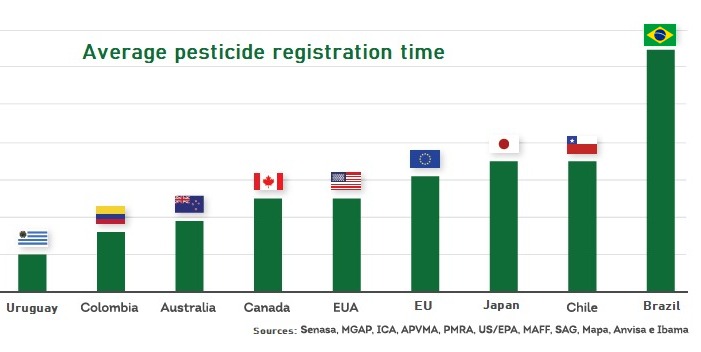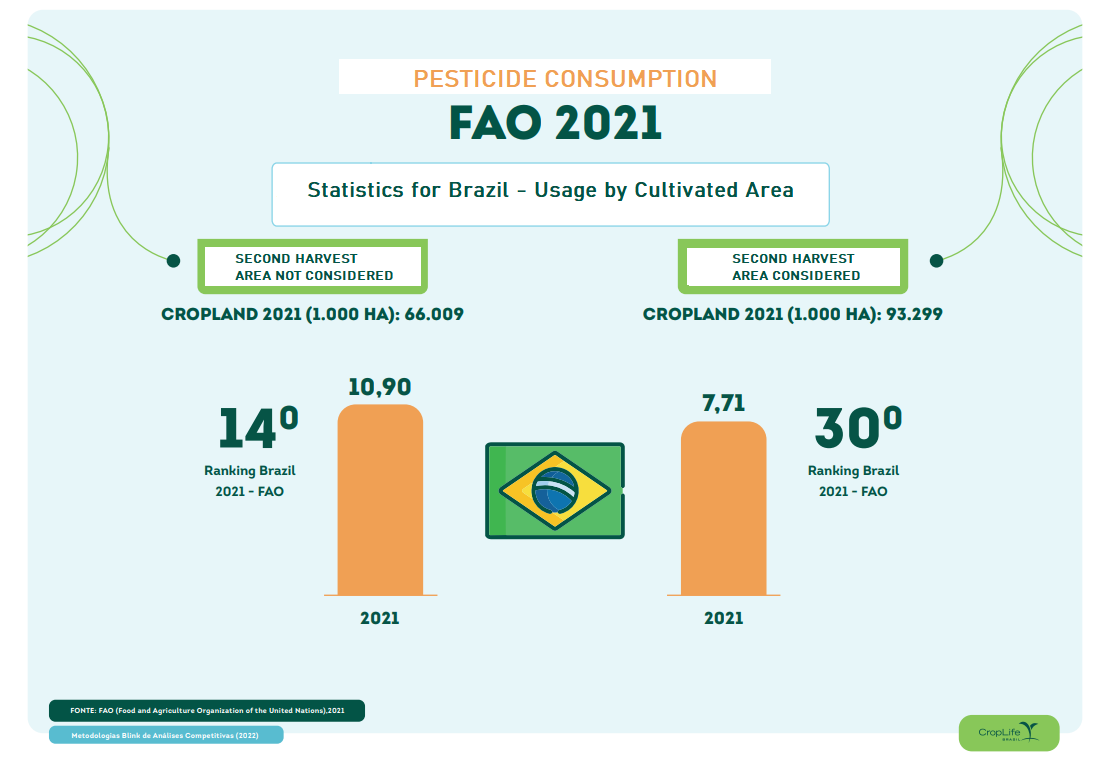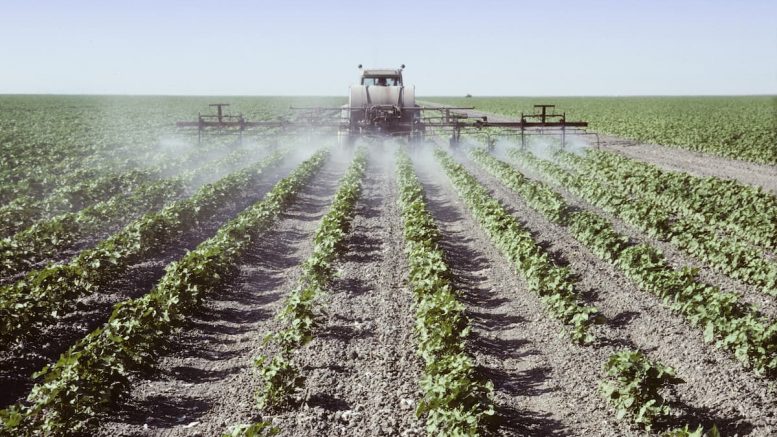“In order to have an idea of Brazil’s competitive gap, of the 29 new pesticides being analyzed for use in the country, 17 of them are already being used in the USA; 16 in Canada…”
Eduardo Leão is president of CropLife Brasil, an agronomist, with a M.Sc degree in applied economics from the Escola Superior de Agricultura Luiz de Queiroz, an MBA in Government Relations from Fundação Getúlio Vargas, and a PhD in applied economics from the University of São Paulo.

Eduardo Leão, president of CropLife Brasil
AgriBrasilis – How can the Pesticide Bill No. 1459/2022 help Brazilian agriculture?
Eduardo Leão – The Bill No. 1459/2022 aims to modernize Law 7802/89, in force for almost 35 years, which is outdated in relation to legislation in other countries with competitive agriculture.
If the Bill is approved, Brazilian agribusiness will have a more efficient product analysis process, in addition to greater predictability for the launch of new active ingredients, increasing agricultural sustainability.
Currently, the time for analysis and approval of new, safer, more advanced, and effective pesticides can exceed eight years. In countries such as Australia, Canada, the USA, and Japan, this evaluation takes place in less than four years, and with the same scientific rigor in relation to agronomic effectiveness, and safety for people’s health and the environment.
In order to have an idea of Brazil’s competitive gap, of the 29 new pesticides being analyzed for use in the country, 17 of them are already being used in the USA; 16 in Canada; 15 in Australia; 14 in Japan, and 13 in the EU. Why should Brazilian farmers be left behind? The modernization of the regulatory framework for pesticides is essential for the competitiveness and sustainability of Brazilian agriculture.

Source: Crop Life
AgriBrasilis – What are the demands of the pesticide market? What difficulties does it face?
Eduardo Leão – The pesticide market seeks greater predictability and legal certainty, which are fundamental for international competitiveness and the sustainability of agriculture.
It is important that regulations are modernized and that pesticide assessments/evaluations are carried out based on technical and scientific criteria, aligned with the best regulatory practices. Such criteria must be compatible with the reality of the different agricultural scenarios in Brazil.
According to the FAO, around 40% of the world’s agricultural production is lost every year due to pest attacks. In Brazil, the tropical climate contributes to the proliferation of pests, diseases and weeds to occur more intensely than in countries with a temperate climate, where temperatures are much lower in winter. Still, if we compare the use of pesticides by area in the world, and consider the fact that Brazil carries out two or even three harvests in the same area, we are in 30th place in consumption per kg/hectare.

Source: Crop Life
AgriBrasilis – Could you comment on the dynamics of product prices?
Eduardo Leão – As more than 70% of pesticide demand is met by imports, price dynamics are directly impacted by global issues, such as variation in international prices of raw materials, exchange rate variations, logistics, and geopolitical issues, as we saw in relation to the war between Russia and Ukraine, for example.
The expectation for the 2023/24 harvest is that prices in dollars will fall due to the restructuring of the supply network, the reorganization and more significant planning of companies and suppliers abroad, as well as a normalization of stocks of technical products and components of formulation.
For the industry, sea freight is returning to historic levels. The logistical challenge lies in the distribution chain of inputs to farmers, which competes directly with crop transport freight.
AgriBrasilis – The State of Ceará has banned spraying using agricultural aircraft. How has this impacted the market? Is it possible for this ban to occur in other States?
Eduardo Leão – Aerial spraying is an ally of sustainable agricultural production. In crops where the plants are taller (banana, eucalyptus, corn, soybeans, cotton and sugarcane, for example), or irrigated (such as rice), aerial application is the most viable alternative to protect farms.
Aerial spraying is directly linked to Agricultural Aviation (manned aircraft) and Drones (unmanned). The practice was banned in Ceará in 2019, due to a political decision process, even without a proven causal relationship with supposed cases of contamination.
In Brazil, three federal agencies are responsible for regulating aerial application: MAPA, the National Civil Aviation Agency (ANAC) and COMAER, DECEA. Indirectly, Ibama and Anvisa, which have regulatory powers for chemical and biological pesticides, participate in aspects involving the analysis of risks to the environment and human health, respectively.
The ban on aerial spraying in the State of Ceará has created a negative precedent for agriculture, as there are similar Bills in other states. Entities representing the market are monitoring the progress of the Law Bills and have participated through experts, explaining to parliamentarians and society about the importance and safety of aerial applications in Brazil. In some states, Bills are already being shelved or rejected by the majority of parliamentarians in the legislative houses.
AgriBrasilis – What could change with the new regulation of bioinputs?
Eduardo Leão – The new regulation of bioinputs can bring significant changes to the way biological products are regulated and perceived in the market. Previously, biological products, whether natural or similar, were classified under the pesticides and fertilizers law. With the new regulation, they will be treated by a single legislation, regardless of whether the functions are control, stimulation or growth promotion.
This change corrects a discrepancy in the rules that treated fertilizers and pesticides separately. Now, with unified legislation, it is expected that there will be assessments/evaluations that are more aligned with the specific characteristics and peculiarities of bioinputs.
In a broader perspective, this standardization could facilitate the research, development, registration and commercialization of these products, as they will be under a unique regulation. Furthermore, it can provide more clarity and transparency for farmers and consumers, ensuring the safety and effectiveness of bioinputs.
AgriBrasilis – What is the market forecast for 2023?
Eduardo Leão – An increase in planted area is expected in border regions and an increase in the conversion of underutilized pastures into soybean areas in the Cerrado Biome.
Growth is estimated in areas cultivated with soybeans, off-season corn, and sugar cane, and stability in the cotton area. Areas planted with summer corn, rice, and beans should suffer a slight reduction. In general, there will be a small increase in the planted area and in the volume of chemical pesticides applied.
Regarding the value of the chemical pesticides market in 2023, it will probably be lower than in 2022 due to the downturn, mainly caused by higher transit stocks and price adjustments. With the reduction in commodity prices, farmers are working hard to reduce production costs.
In relation to the biological market (inoculants + biopesticides), the trend is towards increased adoption, as the segment recorded a 23% growth in the area treated between the 2017/18 and 2022/23 seasons.
In the 2023/24 season, the biological market is expected to maintain the growth rate already observed in previous years. Several justifications support this prediction: firstly, there is a growing demand for biological solutions in agriculture, as farmers seek integrated and efficient management alternatives. Furthermore, the adoption rate of these solutions has increased, signaling a trend of change in traditional agricultural methods. Finally, continuous technological innovation has made more biological options available on the market, expanding the variety and potential use of these products. Therefore, considering these factors, the biologic products market has robust indications of continued growth.
READ MORE:

